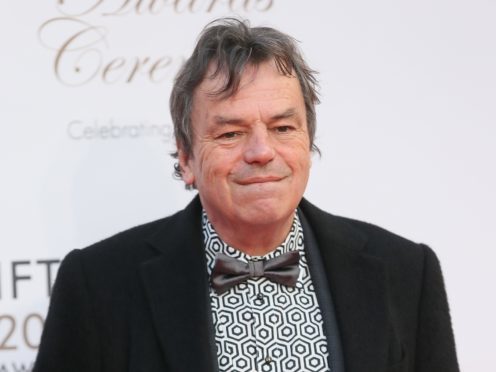Oscar-winning screenwriter and director Neil Jordan has donated over 25 years of archive material – including scripts and unpublished drafts – to the National Library of Ireland.
The Irish-born director achieved international critical acclaim for his writing and directing for films including Michael Collins, The Butcher Boy, and Breakfast On Pluto.
More than 120 archival boxes have been donated to the National Library of Ireland (NLI) and include film and TV scripts, production files, storyboards, plays, notebooks and personal correspondence with artistic collaborators and political figures.
One of the documents includes a Michael Collins poster calling for 2,000 male extras for the scene where political leader Eamon De Valera addresses a large crowd “denouncing the Peace Treaty” between Great Britain and Ireland.
The award-winning director was joined by NLI director Dr Sandra Jones and Culture Minister Josepha Madigan to launch the collection in Dublin on Thursday.
Thanks to @NeilPJordan for his wonderful donation to the archive of the @NLIreland @SandriCollins -An incredible asset for Ireland & a treasure trove of notes, storyboards, drafts of his amazing films, novels, plays, TV scripts 🎥📖👏🏻 pic.twitter.com/ppYkqHgo6b
— ⚖️Josepha Madigan (@josephamadigan) August 9, 2018
Speaking about the various items, he said: “It’s everything I have written between 1993 and the present day.
“As you write and make movies, you accrue stuff around you and you don’t know what to do with it and it always amazes me that people are interested in it, but in fact they are.
“You get international requests for archives to do with your film or literary work and I’m just glad that I could have it all in the one place.
“If people want to read it and access it then they can but they don’t have to.”
Looking back on his work, he said: “It’s weird, there’s unpublished drafts of things I have written, there’s scraps of poetry.
“Some of the most interesting things to me, is that when you make a movie like the Butcher Boy, Interview With The Vampire, Michael Collins, I don’t make it myself.
“It’s made by collaborators, the set designers, the camera man, the musician, the costume designers – there’s so much artistry that goes into the silly thing that you might see in a movie in the cinema.”
Some of the highlights of the collection include behind-the-scenes pictures of the Oscar-nominated Michael Collins taken while filming on location in Dublin, research notes for the Oscar-nominated Interview With The Vampire as well as handwritten letters from collaborators and colleagues, such as politician Mo Mowlam and singer Sinead O’Connor.
Born in Sligo in 1950, Neil went on to win an Academy Award for Best Original Screenplay for The Crying Game in 1992, which he wrote and directed.
In 2003, he was honoured with the Lifetime Achievement Award by the Irish Film and Television Academy.
Neil, who used to work in the Dublin library, said he carried out a lot of research in the building.
He added: “To me it occupies a very special place in a very private place, so I was thrilled to be asked to donate these items to the library.
“When you start out writing you get kind of lost, almost homeless, and I think libraries create a sense of home to those who have a sense of what they want to do but no idea how to do it.
“Ireland will always be my home, it gave me my start in writing and filmmaking and has served as the inspiration and backdrop for so much of my work.”
“The @NLIreland plays an essential role in protecting our country’s visual culture & heritage and I am happy to entrust my archive to it. I have often used its magnificent reading room for research & written drafts of short-stories, novels & screenplays there." – Neil Jordan pic.twitter.com/sAL02LtO2D
— DCHG / RCOG (@DeptAHG) August 9, 2018
Dr Collins said: “The NLI is committed to preserving the story of Ireland through literature, film, still image, born digital content and more.
“Neil has had an indelible impact on filmmaking at home and abroad, and we are delighted that he has chosen to donate his rich and diverse archive to the NLI.
“Researchers love nothing more than to see a draft of a film, a play, a book evolve over time.”
Ms Madigan, Fine Gael TD, said: “This donation is unique and represents a significant item of Irish cultural heritage.
“It provides a fuller understanding of each of Neil’s films and is an important insight into his creative process and practice in both film and literature.
“The National Library is a treasure trove for Irish film history, and this generous donation is a deeply important addition and ensures the safeguarding of the material for generations to come.”
The director also spoke about streaming services, including Netflix and how it has changed the movie industry.
He said: “I wish the movie industry was exactly like it was in 1980 and 1990 but it’s not, things change and tastes change.
“What’s happened by accident is there is this extraordinary new long-form way of telling stories, which is an amazing thing.
“I did one series myself called The Borgias and that was a movie I was going to make that was to last two hours but because Showtime commissioned a whole series of it, it lasted 40 hours.
“There’s a great new tool available to people like me, but the corollary of that is the exhibition end of things that is shrinking and shrinking and that’s rather sad, but things change and things are changing rather rapidly.”
